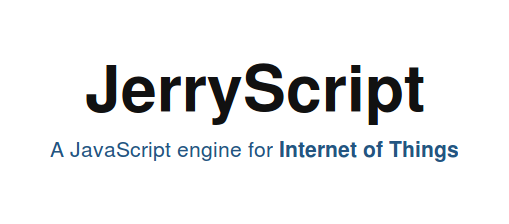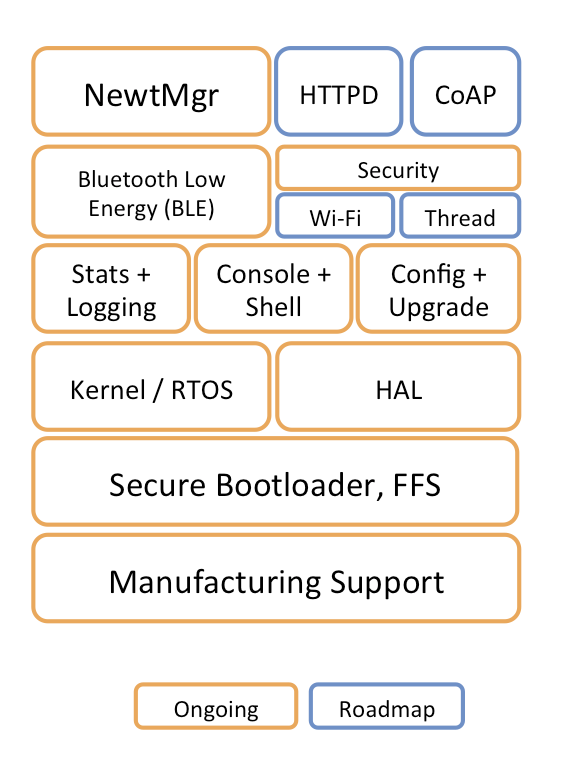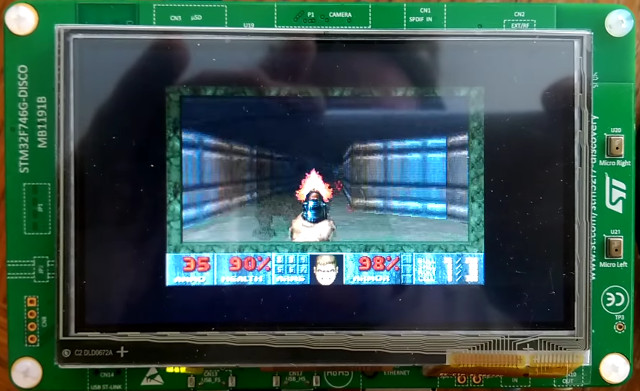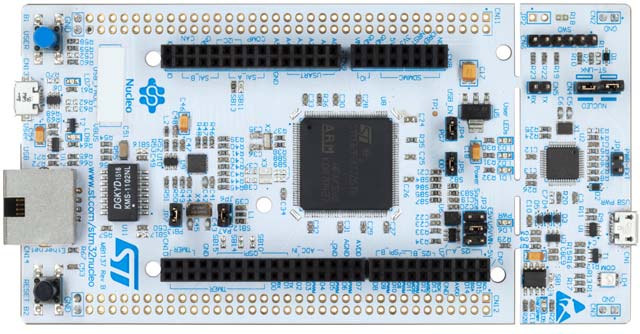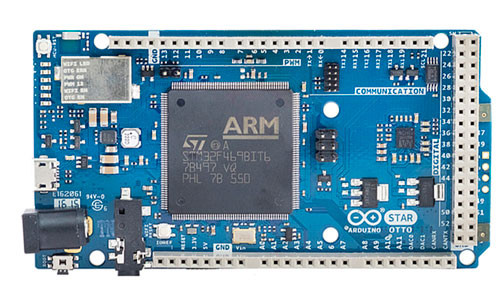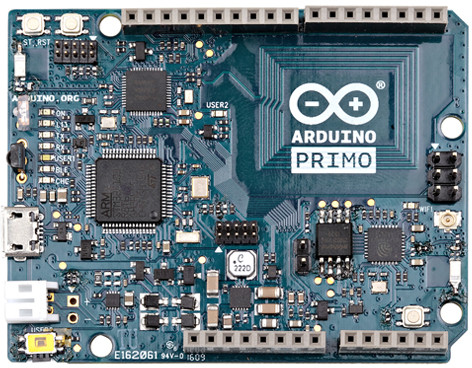In the old days, micro-controller programming was all done in assembly or C, but in recent years higher level languages, included interpreted ones such as Python and JavaScript, have made their ways into MCUs with projects such as MicroPython or Espruino (JS) often running on STMicro STM32 ARM Cortex M micro-controllers, but also other platforms such as ESP8266. As I browsed through the Embedded Linux Conference Europe 2016 schedule, I discovered that Samsung worked on it own implementation of a JavaScript engine for the Internet of Things: JerryScript. It is a full implementation of ECMAScript 5.1 standard written in C that can run on micro-controllers with less than 64KB RAM, and less than 200KB storage (160KB footprint with ARM Thumb-2 compilation). JerryScript is comprised of two main components: Parser and Virtual Machine (VM), with the parser performing translation of input ECMAScript application into byte-code than is then executed by the Virtual […]
STMicro STM32 ARM Cortex M3 Boards List and Wiki
STMicro STM32 has popular Cortex-M micro-controller found in the $2 “Blue Pill” board, STMicro’s own Nucleo Board, as well as many other variants. Olavi Kamppari (OliviliK), working on hard real-time control with EmBitz IDE, has created a detailed Wiki for STMicro STM32 on Github with lots of information, including an interesting comparison table of various STM32 Cortex M3 boards (and one GD32 board). I’ve reproduced the table in his wiki below, made is sortable & filterable, and added links to Aliexpress store found in other parts of the wiki. You can find much more details about each board in the Wiki. Thanks to Zoobab for the tip. Jean-Luc Aufranc (CNXSoft)Jean-Luc started CNX Software in 2010 as a part-time endeavor, before quitting his job as a software engineering manager, and starting to write daily news, and reviews full time later in 2011. www.cnx-software.com
Apache Mynewt RTOS for IoT Includes an Open Source Bluetooth 4.2 LE Stack for MCUs
The Apache Software Foundation has recently released version 0.9 Apache Mynewt open source real-time operating systems for micro-controllers under… an Apache 2.0 license. The RTOS works on STMicro STM32 Cortex-M4, and Arduino Zero / M0 Cortex-M0 boards, but they’ve also implemented the first open source Bluetooth Low Energy stack for MCUs, starting with support for Nordic Semi nRF52 Cortex-M4 and nRF51 Cortex-M1 evaluation boards, and acting as a replacement for Nordic SoftDevice Bluetooth Smart / LE solution. The operating system competes with ARM mbed, the Zephyr Project, and RIoT, but the foundation claims it is the only one that’s both community driven and permissively licensed (Apache 2.0) project in the embedded space. The OS is modular and can be configured with a Go-like build and package management tool with components such as secure boot loader, flash file system and TLV storage mechanism, rich logging infrastructure, circular buffering schemes, and Bluetooth […]
Frosted OS is an Open Source POSIX Operating System for Cortex-M Micro-controllers
Frosted, which stands for “Free Operating Systems for Tiny Embedded Devices”, is an OS with a POSIX-compliant system call API, borrowing the Linux kernel kconfig for configuration, and currently supporting ARM Cortex M0,M3,M4, and M7 MCU including Texas Instruments Stellaris LM3S, STMicro STM32F4/F7, and NXP LPC17XX micro-controllers. The developers are focusing on IoT applications, as well as porting retro-games such as Doom. The kernel relies on libopencm3 for hardware abstraction, and the operating system can be built with GCC ARM for Frosted using the source code released under a GNU GPLv2 license. The Wiki explains how to build and run the OS on either Qemu (in a Linux computer) used LM3S target, or an STM32F4 Cortex -M4 or STM32F7 Cortex-M7 board. The team also uploaded showing a video of Doom (fdoom) running on STM32F7 board, and possibly adapted from stm32doom port. If you are interested in joining the project you can […]
STMicro Unveils Two Low Cost STM32F7 ARM Cortex M7 Development Boards
STMicroelectronics introduiced its STM32F7 ARM Cortex M7 micro-controller family in 2014, and they released a $49 STM32F746G discovery board later in 2015. The company has now launched two new low cost development boards with the $23 STM32 Nucleo-144 board based on STM32F767 MCU, and a $79 Discovery Kit powered by STM32F746 MCU with TFT-LCD and MIPI-DSI support. STM32 Nucleo-144 development board Key feature of NUCLEO-F767ZI board: MCU – STMicro STM32F767ZI ARM Cortex M7 microcontroller @ 216 MHz with FPU, DSP, MMU, 2MB flash, 512 KB SRAM, 16 KB instruction TCM RAM (for critical real-time routines), and 4 KB backup SRAM Connectivity – IEEE-802.3-2002 compliant Ethernet connector USB – 1x micro USB OTG or full speed device Extension: ST Zio connector including support for Arduino UNO v3 connectivity, and additional signals (A6 to A8, D16 to D72) ST morpho extension pin header footprints for full access to all STM32 I/Os On-board […]
$49 STEVAL-WESU1 Wearable Sensor Unit Reference Design is Based on STMicro STM32 MCU
STMicroelectronics STEVEL-WESU1 is a wearable open source hardware reference design and development kit comprised of a board with STM32L1 ARM Cortex-M3 micro-controller, BlueNRG-MS Bluetooth LE chip, and sensors, a battery, and a watch band. STMicro “WESU” specifications and features: MCU – STMicro STM32L151VEY6 32-bit ARM Cortex-M3 MCU @ 32 KHz to 32 MHz, 512KB flash, 80 KB SRAM Connectivity – Bluetooth 4.0 LE via BlueNRG-MS BLE network processor Sensors – 3D accelerometer + 3D gyroscope (LSM6DS3), 3-axis magnetometer (LIS3MDL), MEMS pressure sensor (LPS25HB) USB – 1x micro USB port for recharging Debugging – SWD connector for debugging and programming capability Power 100 mAh Li-Ion battery included, UN38.3 tested and certified STNS01 Li-Ion linear battery charger STC3115 Fuel gauge IC Watch strap with plastic housing included Certifications – FCC (FCC ID: S9N-WESU1), IC (IC: 8976C-WESU1), RoHS The kit can be controlled by ST WeSU app for Android and iOS, and developed using BlueST […]
STAR OTTO Arduino Board is Based on STMicro STM32 32-bit Cortex-M4 MCU & ESP8266 WiFi SoC
Thanks to STMDuino32 community, there was already support for the Arduino IDE on board based on STMicro STM32 ARM Cortex-M micro-controllers, but STMicroelectronics and Arduino Srl have introduced the STAR program to bring official support, and unveiled their first board with STAR OTTO Arduino board powered by STM32F469 Cortex M4 MCU at Maker Faire Bay Area 2016. Key features of STAR OTTO board (ARD-OTTO-STM32): MCU – STMicro STM32F469BIT6 ARM Cortex-M4 MCU @ 180 MHz with 2 MB Flash memory, 384 KB SRAM, Chrom-ART graphics accelerator System Memory – 16 MB SDRAM Storage – 128 KB EEPROM, microSD slot Connectivity – Wi-Fi 802.11b/g/n @ 2.4 GHz via Espressif ESP8266 Display I/F – MIPI DSI display interface Camera – Camera connector Audio – 2x MEMS digital microphones, headphone and speaker output USB – 1x micro USB host interface Expansion – Arduino Uno, Due, Mega connectors including 8x ADC, 2x DAC, 32 digital […]
Arduino Primo Board Supports WiFi, Bluetooth LE, and NFC
A couple of weeks after unveiling Arduino UNO WiFi with ESP8266 and Atmel AVR, Arduino Srl has introduced Arduino PRIMO board with Nordic Semi nRF52 MCU with Bluetooth Smart and NFC, ESP8266 for WiFi, and STM32 to handle GPIOs and USB UART during May Faire Bay Area 2016. Arduino Primo board (A000135) specifications: Service Micro-controller STMicro STM32F103R8T6 ARM Cortex-M3 MCU @ 72 MHz with 64KB flash, 20KB SRAM USB/Uart converter & CMSIS-DAP GPIO expander, IrDA Board power management Operating Voltage – 2.0 to 3.6 V Arduino Micro-controller Nordic nRF52832 ARM Cortex-M4F MCU @ 64 MHz with 512 KB flash, 64KB SRAM Analog I/O Pins – 6 + 1 DAC DC Current per I/O Pins – 7 mA Bluetooth Smart – Up to +4 dBm output power, -96 dBm sensitivity Other features – PDM interface, AES HW enc, NFC tag WiFi Micro-controller Espressif ESP8266 Tensilica Xtensa LX106 WiSoC @ 80 MHz […]


